Welcome to our software development blog series! We set off on an exciting voyage into the world of programming languages in this session, concentrating on the adored Python. The difficult decision of "Which programming language should I choose?" confronts developers frequently at a crossroads. Do not be alarmed; we are assembled here to explore Python's superiority over other programming languages and to uncover its mysteries. Python is a leader among its peer’s thanks to its beautiful syntax and wide range of libraries. Join us as we explore Python's fascinating world and learn about its distinctive features, versatility, and unmatched developer experience. So fasten your seatbelts and get ready to be mesmerized by Python's alluring charm!
What is Software Development?
In software development, content is created, coding is performed, tests are run, and maintenance is performed. It entails writing computer programs that provide computers the ability to carry out particular functions or execute particular jobs. To create applications for multiple platforms, including desktop computers, mobile devices, web browsers, and servers, software developers employ programming languages, software development tools, and frameworks.
The stages of the software development process typically include:
-
Requirement analysis:
Requirement analysis is acquiring and comprehending the software system's needs through consultation with stakeholders, users, and clients. It involves figuring out what the program should offer in terms of features, functionality, and goals.
-
Design:
The architecture and structure of the software are planned at this point. A plan for the software, comprising all of its elements, modules, and interfaces, is made by the developers. To guarantee that the software satisfies the criteria found in the earlier stage, design choices are taken.
-
Implementation:
Based on the design, developers create the software's real code. They write the code in programming languages like Java, C++, Python, or JavaScript. An instruction set is created during this phase that enables the design to be implemented on a computer.
-
Testing:
After the code is written, it needs to be properly tested to find any errors or problems and then fixed. Testing involves performing a variety of test cases to examine the behaviour, dependability, and performance of the software. Software can be used to automate testing or to carry it out manually.
-
Deployment:
The software is deployed to the production environment once it has successfully completed the testing process. This entails setting up the programme on the appropriate platform and making it accessible to and usable by end users.
-
Maintenance:
After the software is installed, it needs constant upkeep and assistance. The software must be updated to add or improve new features, answer user input, solve issues, and ensure compatibility with new hardware or operating systems.
Tools for collaboration, version control, and project management are frequently used to support teamwork and monitor progress throughout the software development process. Agile approaches are widely used to manage the development process iteratively and progressively, allowing for flexibility and adaptation to changing requirements. Examples of these methodologies are Scrum or Kanban.
Software development encompasses many activities, including front-end development (user interfaces), back-end development (server-side logic and databases), mobile app development, web development, and game development. Building reliable and efficient software systems requires technical skills, problem-solving abilities, and creativity.
What is Python?
Guido van Rossum developed the high-level, interpreted Python programming language, which was originally made available in 1991. It is one of the most widely used programming languages in the world because of its simplicity, readability, and versatility.
Python places an emphasis on simple syntax and code readability, which enables programmers to express concepts in less code than they might in other languages. Instead of relying on braces or keywords to describe code blocks, it uses indentation, which makes the code more readable and uniform visually.
Programming styles supported by Python include procedural, object-oriented, and functional programming. For activities like file manipulation, network programming, web development, scientific computing, and more, it contains a sizable standard library that offers a wide range of modules and operations.
In addition, Python has a sizable ecosystem of outside libraries and frameworks that expand its functionality for particular industries. Python may be used for many different things, including web development, data analysis, artificial intelligence, machine learning, scientific computing, automation, scripting, and more thanks to its adaptability. It is widely used across numerous industries, and a thriving community of Python software development services supports its expansion and improvement.
Python vs. Other Programming Languages: Why Choose Python for Software Development?
There is no doubt that Python is the most popular programming language among developers across the globe because it is powerful, versatile, and extremely flexible. It is a great option for software development because it has several advantages over other programming languages. The following are some main justifications for picking Python:
1. Readability and Simplicity:
- The grammar and organisation of Python are built with readability and simplicity in mind. Because of its clear and simple code, it is simpler to comprehend and maintain and helps developers to express concepts in less lines.
- The use of indentation in Python's syntax encourages code consistency and readability while lowering the likelihood of errors brought on by improper indentation.
2. Wide Range of Applications:
- Web development, scientific computing, data analysis, automation, artificial intelligence, and other areas are only a few of the many uses for Python. It may be used to develop both straightforward scripts and intricate programs due to its versatility.
- Python includes a diverse ecosystem of libraries and frameworks, including Flask for creating APIs, TensorFlow and PyTorch for machine learning, NumPy and pandas for data analysis, and Django for web development. Custom software development services can utilize the technologies that are already available and accelerate development thanks to these resources.
3. Large and Active Community:
- A sizable and vibrant developer community supports Python's expansion and advancement. Finding solutions to programming problems is made simple by the community's support through online forums, mailing lists, and social media platforms.
- Due to its vibrant community, Python also has access to a large number of third-party libraries and packages that provide a wide range of functions. These libraries are simple to incorporate into your projects, saving you time and energy from having to start from scratch.
4. Cross-Platform Compatibility:
- Python is a multi-platform programming language that works on a variety of operating systems, including Windows, macOS, Linux, and others. Hire Python developers so they can create code once and deploy it across various platforms without requiring large changes.
- Python is a great option for designing apps that must operate on many operating systems because of its cross-platform interoperability, which lowers development and maintenance expenses.
5. Rapid Development and Prototyping:
- Python's expressive syntax and ease of use make it possible for programmers to write code quickly, leading to shorter development cycles. Because of this, it's a great option for prototyping and iterative development, enabling developers to quickly test ideas and concepts.
- Python offers a large selection of libraries and frameworks, which accelerates development even more. By offering pre-built elements and features that are simple to integrate, these resources help developers save time and effort by avoiding the need to write code from start.
6. Strong Support for Integration:
- Python is a good option for creating intricate software ecosystems because of its prowess at integrating with other systems and languages. It allows programmers to take advantage of existing codebases and libraries because it can interface with languages like C/C++, Java, and .NET with ease.
- Network protocols, web services, and databases are all well-supported by Python. This makes it possible to seamlessly integrate with many data sources and APIs, which makes it easier to design scalable and linked applications.
7. Great for Data Analysis and Scientific Computing:
- Python offers strong libraries that are frequently used in scientific computing and data analysis, such as NumPy, pandas, and matplotlib. These packages provide significant functionality for data analysis, visualization, and statistical modeling.
- Python is a great alternative for researchers and scientists who wish to concentrate on their domain expertise rather than complex programming intricacies because of its simplicity and readability. They can efficiently analyze data and execute intricate calculations thanks to it.
Takeaway!
In conclusion, Python web development stands out among other programming languages due to its simplicity, readability, and versatility. It's clean syntax and extensive libraries make development faster and more efficient. Python's wide range of applications, including web development, data analysis, and artificial intelligence, coupled with its large community and ecosystem, make it an ideal choice for developers looking for a powerful and user-friendly language.


No comments yet